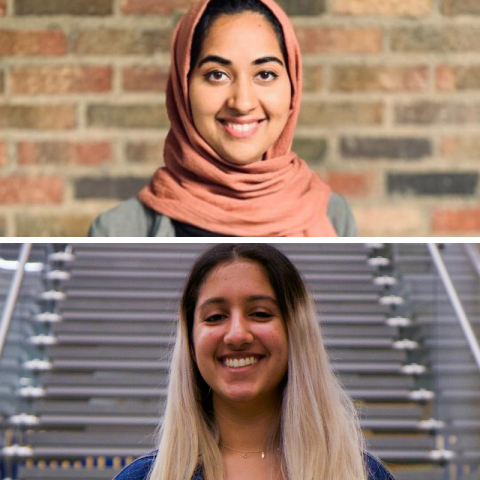June 2, 2020 | By Smitty Smith (they/them/theirs), Writer/Photographer Student Lead
In the wake of COVID-19, many changes were made across the Ann Arbor campus. Many programs scrambled to find a way to adapt as more and more precautions were being created in order to keep the university and its staff and students safe. The Office of Multi-Ethnic Student Affairs (MESA) is one of many units that were faced with the task of determining how they could adapt their schedule of events to the new remote conditions brought about by the pandemic.
MESA hosts Asian/Pacific Islander American (A/PIA) Heritage Month, and Arab Heritage Month, which is celebrated university-wide each year. A/PIA HM is celebrated from mid-March to mid-April, and Arab HM is celebrated throughout April. Usually, MESA has different events scheduled on campus that highlight and open discourse on the heritage, history, and identities of the A/PIA and Arab communities. However, due to COVID-19, the heritage months went virtual. I interviewed Anooshka Gupta (she/her/hers), co-Undergraduate Student Coordinator for A/PIA Heritage Month and Nida Syed (she/her/hers), Graduate Student Program Coordinator for Arab Heritage Month to gain insight on how the heritage months were adapted to accommodate the virus.
More information on A/PIA Heritage Month and Arab Heritage Month can be found on MESA’s website.
Smitty: What was it like to have to change your original plans for the heritage months due to COVID-19?
Anooshka (A/PIA HM): “It was bittersweet, to say the least. We got the news about COVID-19 precautions the day before our Opening Ceremony and, as such, canceled a majority of our events. However, I say bittersweet, because we still had the opportunity to celebrate and engage with A/PIA Heritage Month – it just looked different than initially planned.”
Nida (Arab HM): “It was as if a rug was pulled from underneath us. The day the university announced the shift to virtual classes was the day we were set to kick off Arab Heritage Month, including the calendar of events and invitation to our opening ceremony the following week. In fact, our AHM Kick-Off event Chai and Chobi organized by the Iraqi Student Association was that very night.”
S: Which events were adaptable, and which were not? Why?
A (A/PIA HM): “We canceled 21 in-person events and adapted six. We wanted to honor our two contracted events, as our Leadership Team believes in the importance of supporting scholarship, the arts, and compensation. We also added two events: Trivia Night and a Community Gathering.”
N (AHM): “All of MESA’s physical events for Arab Heritage Month were canceled - Opening Ceremony, Closing Ceremony, and our keynote speaker engagements. Other departments, units, and student organizations participating in AHM canceled their events in the days following. As a result, we had to rethink our entire strategy and calendar of events so that AHM could still be successful through MESA’s social media. Thanks to the incredible efforts of Professor Carol Bardenstein, we were also able to feature two virtual workshops on Arab folk dance and classical Arab percussion and Rhythm featuring Egyptian dancer, percussionist, musician, DJ, and composer Karim Nagi. ”
S: How successful was engagement during this time?
A (A/PIA HM): “I am happy with the level of engagement A/PIA Heritage Month received. We did not have the opportunity for outreach to students not typically involved with A/PIA happenings around campus, but within our immediate circles, all of our events had great attendance rates and received positive feedback!”
N (AHM): “My team and I focused on the following: intentionality, fostering awareness, connections, and community, and showcasing the diversity and achievements of the Arab community. In those regards, we were very successful with our social media posts. While we initially boosted posts, we did so in a manner to see how best to engage with folks and what content was resonating with people. We chose not to simply define success by our social media engagement statistics.”
S: What did you learn in the process of adapting to this unprecedented time?
A (A/PIA): “I learned a few different pieces in relation to online engagement and accessibility. I had not previously realized how much could happen online, and I appreciated the ability to have these workshops available to people outside of the U-M community. In terms of accessibility, I think I’m always learning, since there are so many different pieces involved in allowing people to fully participate in different events.”
N (AHM): “I am immensely grateful for the community I found and built here at the University of Michigan. Specifically, I am thankful to MESA for the community they fostered and the flexibility they offered student staff during this virtual transition. I had the ability to still work during this unprecedented economy and hone my social media marketing and content planning skills. I was also able to connect with my colleagues on a deeper level than ever before. ”
S: How do you think COVID-19 will impact student leadership on campus in higher education?
A (A/PIA): “I think that a number of pieces will look different. If this continues on for the next semester or so, I believe that student leadership will focus on planning and envisioning for future students. However, I do believe that we can use lessons learned from A/PIA Heritage Month to encourage learning and event attendance.”
N (AHM): “Whether or not we return physically to campus in the Fall, there will be a greater need for student leaders with digital marketing and communication skills. I think many student organizations, departments, and units are realizing the importance of maximizing social media engagement to stay connected with our campus community, including prospective students and alumni. In addition, student leadership roles across departments and units may be limited due to ongoing funding issues and hiring freezes. However, I know University of Michigan students are capable of fostering positive, sustainable change even during these unprecedented times.”

